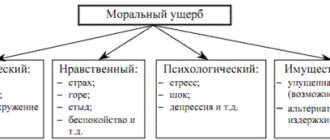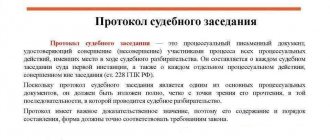Rules for writing a statement of claim to court
The document must comply with the form established by Article 131 of the Code of Civil Procedure of the Russian Federation and contain the following information:
- the name of the judicial authority to which the claim is sent;
- personal and contact information of the parties to the process;
- description of the circumstances of the incident and information about witnesses who can confirm the fact of the incident;
- requirements for the defendant that must be clearly substantiated;
- list of attached documents;
- personal signature of the applicant or his authorized representative.
The greatest difficulty in drawing up a claim for moral damages is determining the amount of compensation and its justification.
Attention! The amount of compensation for moral damage claimed by the plaintiff may be reduced by the judge if he considers it too high.
When determining the amount of the penalty, a number of factors must be taken into account:
- the financial situation of the defendant;
- the amount of losses suffered by the applicant as a result of slander, which resulted in loss of confidence in him;
- the degree of physical damage and the depth of moral injury;
- other possible factors.
The amount of compensation for moral damage caused is a relative value, therefore cases of this type are among the most complex from a legal point of view. Therefore, it is recommended that you consult with an attorney before filing a claim. A specialist will help calculate the amount of claims, justify it, and develop a strategy for protecting the client’s rights in court. He will form an evidence base, draw up documents, determine a list of persons who can be brought in as witnesses, and interview them.
If the applicant decides to protect his interests independently, it is recommended to use a sample claim for violation of moral rights, drawn up in accordance with all the rules of current legislation.
Is it possible to prove moral damages in court?
It is possible to prove moral damage in court if there is evidence that such harm has been caused to a citizen. Moral damage is usually understood as the commission of actions or inactions that entailed negative changes in the life of the victim and caused him moral or physical suffering. Moral damage can affect both property and non-property benefits.
Non-property benefits include:
- life and health;
- personal integrity;
- honor and dignity (insult);
- reputation (for example, it was damaged by slander);
- rights related to personal and family spheres of life.
Suffering can be moral and physical. When the harm was caused in the form of injuries or diseases, it belongs to the group of physical suffering. Concerns about the violation of one or more human rights that are not of a physical nature bring moral suffering.
It is necessary to prove:
- presence of an unlawful act;
- harming a person morally;
- connection between action and consequences.
Without such an evidence base, the court will not be able to make a decision in favor of the plaintiff, since this is the main confirmation that the citizen really felt suffering.
Description of harm caused
After experiencing a shock, it is usually difficult for the injured person to gather his thoughts and put on paper all the experiences that he experienced. Therefore, the first thing you should do is collect evidence, for example, medical documents, from which it follows that:
- the plaintiff developed apathetic behavior;
- he is in a state of neurosis associated with the stress he has experienced;
- the plaintiff is depressed;
- the victim has problems sleeping, for example, insomnia;
- the applicant suffers from loss of appetite and is losing weight;
- he developed headaches, anxiety and phobias that had not previously been observed.
If at least one of the listed diagnoses is established, it is recommended to describe in detail how this disease complicates the applicant’s daily life.
Attention! Moral damage is difficult to prove, so you need to try to ensure that the description makes as strong an impression as possible on the members of the court.
It is advisable to point out that the incident in the future may have serious consequences, and today the plaintiff himself and his family members have suffered moral, and possibly psychological, damage.
In relation to the defendant, it is permissible to use words such as immoral, cynical, etc. It is important to indicate how the defendant behaves towards the plaintiff. Perhaps he mocks him, does not repent of his actions, etc.
The following documents can be attached as evidence to the claim for compensation for moral damage:
- medical certificates indicating the diagnosis;
- sick leave that caused absence from work;
- receipts and receipts confirming the purchase of medications, as well as a doctor’s prescription;
- certificate of change of residential address;
- characteristics compiled by the employer;
- administrative protocols recording the fact of the incident;
- examination results;
- death certificates or documents confirming the identity of a citizen dependent on the plaintiff;
- media materials covering the details of the incident;
- other evidence.
Attention! As judicial practice shows, the more evidence the plaintiff attaches to the application, the higher the chances of receiving compensation.
If the fact of the incident was not recorded by law enforcement agencies, it will be more difficult to prove the applicant’s case. In this case, the following materials can be included as evidence:
- witness statements;
- audio recordings of conversations and phone calls;
- video recording of the incident;
- written threats directed at the injured party.
Attention! The main task of evidentiary documents in cases of compensation for moral damage is to establish a cause-and-effect relationship between the disease acquired by the plaintiff and the actions of the defendant.
As an example of justifying claims for compensation for moral damage, we can consider a case where a doctor made a mistake during surgery or during treatment. This is a serious violation, because the most important thing a person has is his health, which he trusts to specialists. Errors made by a doctor can be critical, and their consequences sometimes haunt the victim for the rest of his life.
In such a case, it is advisable to conduct a forensic medical examination in order to identify facts of negligence on the part of the medical worker at the stage of the proceedings. If the results of the examination confirm the plaintiff’s testimony, moral damages are recognized as justified. Next, the victim should be told how difficult it will be for him to live with this problem, how it will affect his career, and also how family members will suffer from worrying about him. In this case, there is a high probability of receiving compensation in the largest amount.
Determination and proof of the amount of compensation for moral damage
Modern realities of Russian national law establish the possibility of compensation for moral damage. However, the implementation of such a possibility still encounters obstacles along the way, due to which the “ideal” implementation of the institution of compensation for moral damage is actually difficult. Moral damage, in accordance with the Resolution of the Plenum of the Supreme Court of the Russian Federation of December 20, 1994 No. 10, is understood as moral or physical suffering caused by actions (inaction) encroaching on intangible benefits belonging to a citizen from birth or by force of law, which, in particular, include life, health, personal dignity, business reputation, privacy, personal and family secrets, etc. or violating his personal non-property rights (the right to use his name, the right of authorship and other non-property rights in accordance with laws on the protection of rights to the results of intellectual activity) or violating the property rights of a citizen.
Moral harm, in particular, may consist of moral feelings in connection with the loss of relatives, the inability to continue an active social life, loss of a job, disclosure of family or medical secrets, dissemination of untrue information discrediting the honor, dignity or business reputation of a citizen, temporary restrictions or deprivation of any rights, physical pain associated with injury caused, other damage to health or in connection with an illness suffered as a result of moral suffering, etc. This leads to an important feature of moral damage, which is that monetary compensation is awarded only for performing such actions (inactions) described above. The institution of compensation for moral damage is one of the important tools for protecting and restoring the violated rights and freedoms of citizens.
However, a significant drawback of the institution of compensation for moral damage is its “lack of demand” by the judiciary, expressed, in particular, in the underestimation of the amount of moral damage awarded in court. Often, courts quite significantly underestimate such monetary compensation relative to the amount of the stated claims. For example, different judges make different decisions on compensation for moral damage in similar cases. Courts rarely award the amount initially claimed by the claim, often awarding significantly less. The whole point is that, according to Art. 1101 of the Civil Code of the Russian Federation, the court independently determines the amount of compensation for moral damage depending on the nature of the physical and moral suffering caused to the victim, as well as the degree of guilt of the harm-doer in cases where guilt is the basis for compensation for harm, assessing the nature of such suffering, taking into account the actual circumstances in which the injury was caused moral harm, and the individual characteristics of the victim. It turns out that in this vein, the judge appears in the person of the appraiser, setting the amount of monetary compensation based on the letter of the law and his own convictions. This raises the second problem of the institution of compensation for moral damage - the problem of proof.
The proof of certain circumstances of causing moral harm in one way or another to some extent affects the amount of monetary compensation. It turns out to be quite difficult, but not impossible, to prove that the declared amount of moral damage caused corresponds to reality in court. In any case, when deciding the issue of compensation for moral damage, the guilt of the causer and the cause-and-effect relationship between his actions (inactions) and the resulting consequences must be considered. The resulting moral and physical suffering must be the result of the actions (inactions) of the person who caused them. The legislator directly states that damage caused by the intent of the victim is not subject to compensation.
A cause-and-effect relationship presupposes an indication of the actual circumstances of causing harm to personal non-property rights or intangible benefits of a person. An unfounded statement by a citizen about causing him moral harm without indicating the circumstances, actions that violate the personal non-property rights of the citizen, or encroachments on personal intangible benefits belonging to him, as well as in the absence of evidence, will rightly result in the court’s refusal to satisfy the stated requirements in this part. Thus, the harm caused, be it moral or physical suffering, must be supported by some evidence, which, for example, includes: certificates from the hospital or from the doctor; documents confirming the presence of certain diagnoses, subject to a cause-and-effect relationship with the actions (inactions) of a person (for example, an indication of depression, often used in a statement of claim containing a claim for compensation for moral damage, must be confirmed by a medical document, since depression is diagnosis); certificates from the employment service; examination; evidence confirming the purchase of certain medications or drugs prescribed according to doctor’s recommendations, etc.
Thus, the more evidence that a person has suffered moral or physical suffering, the more likely it is that the court will satisfy the claim for compensation for moral damage. Also, when determining the amount of monetary compensation for moral damage, the individual characteristics of the citizen to whom it was caused must be taken into account. Such characteristics of a citizen, for example, include: disability; presence of children, including if harm is caused to a single mother; financial situation, etc. Each case is individual and should be considered accordingly. Therefore, it would not be superfluous to present to the court documents confirming such circumstances, if they exist, and in the absence of such, to declare certain individual characteristics. And if in this way it is possible to prove the infliction of moral damage, then the question of the amount of monetary compensation still remains open.
Thus, Judge of the Supreme Court of the Russian Federation, member of the Presidium of the Supreme Court of the Russian Federation Viktor Momotov publicly stated that compensation for moral damage “is often carried out in an extremely low, one might say, “symbolic” amount, which obviously cannot compensate for any suffering and is intended only publicly designate, “mark” the negative attitude of public authorities towards the behavior of the defendant... Recovery of compensation for moral damage in an adequate amount would make it possible to strengthen the rule of law and order in a number of areas of high social significance.”
Also, the Minister of Justice of the Russian Federation, Alexander Konovalov, demonstrated his concern about this problem, who suggested “thinking about establishing uniform criteria when determining compensation, including the possibility of prescribing minimum tariffs for compensation for moral damage,” expressing bewilderment at the colossal spread in the amounts of compensation for moral damage awarded over more or less less identical cases in judicial practice. Naturally, such a position on establishing minimum tariffs when determining moral compensation is not correct, since any case considered in a court hearing is individual and must be considered accordingly. And the establishment of such minimum tariffs will inherently be of an imperative nature, which is not consistent with the principles of civil law. The most correct thing would be to move away from the current practice of assigning such low monetary compensation in a positively progressive direction.
However, public interest in this problem still inspires hope for its resolution. Therefore, bringing such a problem to public hearings, active public discussion, and continuous coverage of it, including by the legal community, is the most effective way and one of the ways to solve it.
Which court should I go to?
To file a claim for compensation for moral damage, you should contact the court of general jurisdiction at the defendant’s place of residence:
- to a magistrate - if the application is submitted simultaneously with a claim of a property nature with a price of less than 50 thousand rubles;
- to the district court - in all other cases.
The plaintiff has the right to file a claim at his place of residence to consider the following types of cases:
- causing harm to health resulting in the death of the breadwinner (such a claim can also be filed at the place where the damage was caused);
- illegal prosecution;
- violation of rights to protect personal data;
- violation of labor rights (the application can also be submitted at the place of execution of the employment agreement);
- violation of consumer rights (it is also permissible to file a claim at the place of execution of the contract).
Cost of state duty in 2021
If the statement of claim includes only a demand for payment of compensation for moral damage suffered, the court initiates a case of a non-property nature. In this case, the state duty on the claim for compensation for moral damage must be paid in the amount of 300 rubles.
If this claim is in addition to a claim of a property nature, the amount of the state duty is calculated based on the price of the claim:
- up to 20 thousand rubles. — 4% of the claim price, but not less than 400 rubles;
- from 20,001 to 100 thousand rubles. — 800 rub. + 3% of the amount exceeding 20 thousand rubles;
- from 100,001 to 200 thousand rubles. — 3,200 rub. + 2% of the amount exceeding 100 thousand rubles;
- from 200,001 to 1 million rubles. — 5,200 rub. + 1% of the amount that exceeds 200 thousand rubles;
- over 1 million rubles — 13,200 rub. + 0.5% of the amount that exceeds 1 million rubles, but not more than 60 thousand rubles.
Attention! To calculate the amount of state duty, it is recommended to use a special calculator located on the official websites of courts of general jurisdiction.







